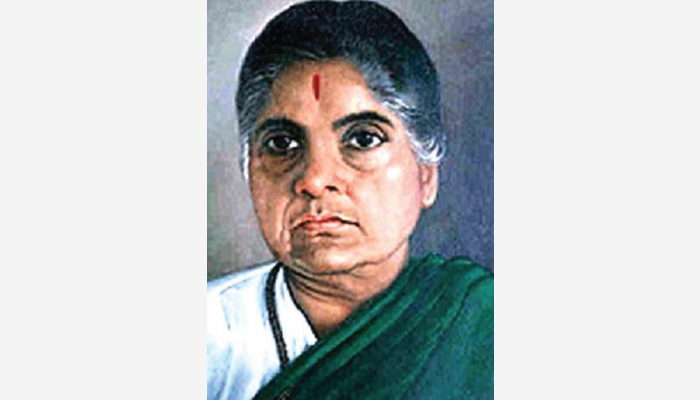
or

Durgabai Deshmukh, Lady Deshmukh (15 July 1909 – 9 May 1981) was an Indian freedom fighter, lawyer, social worker and politician. She was a member of the Constituent Assembly of India and of the Planning Commission of India.
A public activist for women’s emancipation, she founded the Andhra Mahila Sabha (Andhra Women’s Conference) in 1937. She was also the founder chairperson of the Central Social Welfare Board. In 1953, she married C.D. Deshmukh, the first Indian governor of the Reserve Bank of India and Finance Minister in India’s Central Cabinet during the years 1950-1956.
From an early life Durgabai was associated with Indian politics. At age 12, she left school to protest against the imposition of English language education. She started the Balika Hindi Paathshala in Rajamundry to promote Hindi Education for girls.
When the Indian National Congress had its conference in her hometown of Kakinada in 1923,she was a volunteer and placed in charge of the Khadi exhibition that was running side by side. Her responsibility was to ensure that visitors to were not allowed without tickets. She fulfilled the responsibility given to her honestly and even forbade Jawaharlal Nehru from entering. When the organisers of the exhibition saw what she did and angrily chided her, she replied that she was only following instructions. She allowed Nehru in only after the organisers bought a ticket for him. Nehru praised the girl for the courage with which she did her duty.
She was a follower of Mahatma Gandhi in India’s struggle for freedom from the British Raj. She never wore jewellery or cosmetics, and she was a satyagrahi. She was a prominent social reformer who participated in Gandhi-led Salt Satyagraha activities during the Civil Disobedience Movement. She was instrumental in organising women satyagrahis in the movement. This led to British Raj authorities imprisoning her three times between 1930 and 1933.
After her release from prison, Durgabai continued her studies. She finished her B.A and her M.A in political science in the 1930s from Andhra University. She went on to obtain her Law degree from Madras University in 1942, and started practicing as an advocate in Madras High Court.
Durgabai was the president of the Blind Relief Association. In that capacity, she set up a school-hostel and a light engineering workshop for the blind.
Durgabai was a member of the Constituent Assembly of India. She was the only women in the panel of Chairmen in the Constituent Assembly. She was instrumental in the enactment of many social welfare laws.
She failed to get elected to Parliament in 1952, and was later nominated to be a member of the Planning Commission. In that role, she mustered support for a national policy on social welfare. The policy resulted in the establishment of a Central Social Welfare Board in 1953. As the Board’s first chairperson, she mobilized a large number of voluntary organizations to carry out its programs, which were aimed at education, training, and rehabilitation of needy women, children, and the handicapped.
She was the first chairperson of the National Council on Women’s Education, established by the Government of India in 1958. In 1959, the committee presented its recommendations, as follows:
To commemorate her legacy Andhra University, Visakhapatnam has named its Department of Women Studies as Dr. Durgabai Deshmukh Centre for Women’s Studies.
In 1963, she was sent to Washington DC as a member of the Indian delegation to the World Food Congress.
Born in Rajahmundry, Andhra Pradesh, British India, in the Gummidithala family; Durgabai was married at the age of 8[10] to her cousin, Subba Rao. She refused to live with him after her maturation, and her father and brother supported her decision. She later quit him to pursue her education.
In 1953, she married the then Finance Minister of India Chintaman Deshmukh. According to her own account, Prime Minister Jawaharlal Nehru was one of the three witnesses. C. D. Deshmukh had a daughter from a previous marriage but the couple remained otherwise childless. Though she had parted ways with Subba Rao, she supported his widow Timmaiamma after his death. Timmaiamma lived with Durgabai and Chintaman Deshmukh, and Durgabai also organised for her to get vocational training.
Durgabai Deshmukh authored a book called The Stone That Speaketh. Her autobiography Chintaman and I was published one year before her death in 1981. She died in Narasannapeta Srikakulam district.
The LW Bureau is a seasoned mix of legal correspondents, authors and analysts who bring together a very well researched set of articles for your mighty readership. These articles are not necessarily the views of the Bureau itself but prove to be thought provoking and lead to discussions amongst all of us. Have an interesting read through.

Lex Witness Bureau

Lex Witness Bureau

For over 10 years, since its inception in 2009 as a monthly, Lex Witness has become India’s most credible platform for the legal luminaries to opine, comment and share their views. more...
Connect Us:


The Grand Masters - A Corporate Counsel Legal Best Practices Summit Series
www.grandmasters.in | 8 Years & Counting
The Real Estate & Construction Legal Summit
www.rcls.in | 8 Years & Counting
The Information Technology Legal Summit
www.itlegalsummit.com | 8 Years & Counting
The Banking & Finance Legal Summit
www.bfls.in | 8 Years & Counting
The Media, Advertising and Entertainment Legal Summit
www.maels.in | 8 Years & Counting
The Pharma Legal & Compliance Summit
www.plcs.co.in | 8 Years & Counting
We at Lex Witness strategically assist firms in reaching out to the relevant audience sets through various knowledge sharing initiatives. Here are some more info decks for you to know us better.
Copyright © 2020 Lex Witness - India's 1st Magazine on Legal & Corporate Affairs Rights of Admission Reserved